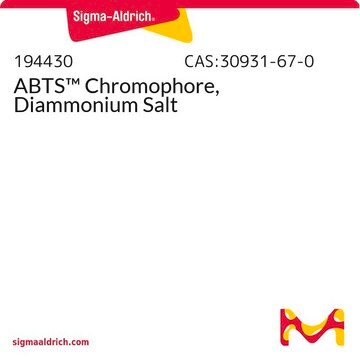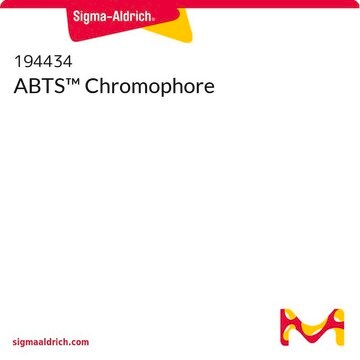A3219
2,2′-Azino-bis(3-ethylbenzothiazoline-6-sulfonic acid)
peroxidase substrate, chromogenic, liquid
Synonym(s):
ABTS
About This Item
Recommended Products
product name
2,2′-Azino-bis(3-ethylbenzothiazoline-6-sulfonic acid), Liquid Substrate System
Quality Level
form
liquid
storage temp.
2-8°C
SMILES string
CCN1C(\Sc2cc(ccc12)S(O)(=O)=O)=N\N=C3/Sc4cc(ccc4N3CC)S(O)(=O)=O
InChI
1S/C18H18N4O6S4/c1-3-21-13-7-5-11(31(23,24)25)9-15(13)29-17(21)19-20-18-22(4-2)14-8-6-12(32(26,27)28)10-16(14)30-18/h5-10H,3-4H2,1-2H3,(H,23,24,25)(H,26,27,28)/b19-17-,20-18-
InChI key
ZTOJFFHGPLIVKC-CLFAGFIQSA-N
Looking for similar products? Visit Product Comparison Guide
General description
Application
Biochem/physiol Actions
Physical form
Storage Class Code
10 - Combustible liquids
WGK
WGK 3
Flash Point(F)
Not applicable
Flash Point(C)
Not applicable
Certificates of Analysis (COA)
Search for Certificates of Analysis (COA) by entering the products Lot/Batch Number. Lot and Batch Numbers can be found on a product’s label following the words ‘Lot’ or ‘Batch’.
Already Own This Product?
Find documentation for the products that you have recently purchased in the Document Library.
Customers Also Viewed
Our team of scientists has experience in all areas of research including Life Science, Material Science, Chemical Synthesis, Chromatography, Analytical and many others.
Contact Technical Service









